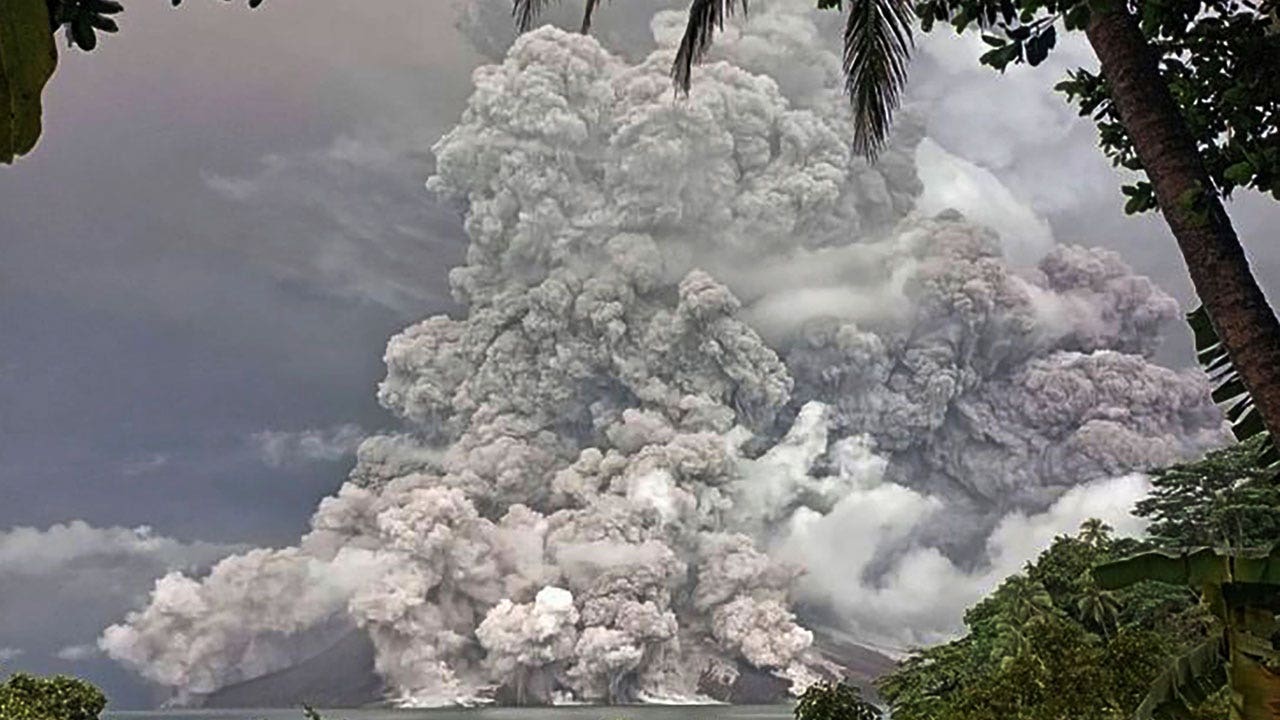News
Iran attacked Israel, escalating an already volatile conflict. Here's what to know

The United Nations Security Council holds a meeting on the situation in the Middle East, including Iran’s recent attack against Israel, at U.N. headquarters in New York City on Sunday.
Charly Triballeau/AFP via Getty Images
hide caption
toggle caption
Charly Triballeau/AFP via Getty Images

The United Nations Security Council holds a meeting on the situation in the Middle East, including Iran’s recent attack against Israel, at U.N. headquarters in New York City on Sunday.
Charly Triballeau/AFP via Getty Images
Iran launched a massive barrage of over 300 drones and missiles at Israel over the weekend — in what is believed to be Iran’s first direct attack on its regional foe from Iranian soil.
Nearly all of the weapons were intercepted by Israel and its allies, including the United States. However, a few of the Iranian ballistic missiles made it through the defenses, severely injuring a 7-year-old girl and slightly damaging a military base in southern Israel, according to Israeli officials.

Iranian officials said the attack was in response to an airstrike from earlier this month that hit Iran’s consulate in Damascus, Syria. Seven Iranian military officials, including two generals, were killed.
Israel neither confirmed nor denied being behind the Syria strike, though Iran and the Pentagon said Israel was responsible.
On Sunday, a senior Iranian military official said Iran’s “operation” against Israel had ended and there would be no more attacks coming, according to Iranian state media.
But tensions continue to run high in the Middle East. Now, the focus is on how Israel and other countries will respond to Iran’s escalation. An Israeli military spokesperson said on Sunday that leaders had “approved operational plans for both offensive and defensive action,” without going into further detail.
Here’s what to know:
Nearly all aerial attacks were intercepted, Israel says, in large part thanks to Israel’s advanced air defense systems

Mohamad Hassouna, 49, points to a hole in the roof of a building caused by a projectile that injured his 7-year-old daughter at their Bedouin village in the southern Negev desert on Sunday.
Ahmad Gharabli/AFP via Getty Images
hide caption
toggle caption
Ahmad Gharabli/AFP via Getty Images

Mohamad Hassouna, 49, points to a hole in the roof of a building caused by a projectile that injured his 7-year-old daughter at their Bedouin village in the southern Negev desert on Sunday.
Ahmad Gharabli/AFP via Getty Images
In the days leading up to the attack, the U.S. and Israel closely coordinated their air defense preparations. Still, a U.S. official described the Iranian barrage as being at the “high end” of what the U.S. and Israel expected.
About 99% of the aerial attacks launched by Iran and its proxies were intercepted outside Israeli airspace, according to the Israeli military. The U.S., France, Jordan and U.K. forces helped take down the Iranian weapons.
Israel’s most advanced air defense system, the Arrow 3, provided the main protection against Iran’s ballistic missiles. The Arrow 3 has been around for several years, but had never faced such an intense onslaught.
Israeli military spokesperson Rear Adm. Daniel Hagari said Sunday that the Arrow 3 had “proved itself against a significant number of ballistic missiles.”
Still, several people suffered from shrapnel wounds after the attack, including a 7-year old Bedouin girl who underwent surgery due to a head wound, the Times of Israel and Haaretz reported. Hagari confirmed the reports.
Iran’s foreign minister, Hossein Amir-Abdollahian, said the country notified the U.S. ahead of the attack through Swiss intermediaries, informing that the strike will not target American personnel or bases in the region. U.S. officials, however, said there was no notification from Iran prior to the attack on where weapons would be targeting.
Israel struck a Hezbollah target in Lebanon and urged the U.N. to condemn Tehran

People gather around a destroyed building targeted by Israeli airstrikes on the village of Nabi Sheet in the Baablbek district in Lebanon’s eastern Bekaa Valley on Sunday.
AFP via Getty Images
hide caption
toggle caption
AFP via Getty Images
On Sunday, Israel said its fighter jets struck an alleged munitions production site in southern Lebanon belonging to the Iran-backed militia Hezbollah.
Israeli’s military said the strike was in response to the Iranian air assault over the weekend, adding that Hezbollah was responsible for about 40 rockets targeted at Israel, the Times of Israel reported.
Israel and Hezbollah have been exchanging fire across the border with Lebanon regularly since the surprise Oct. 7 attack by Hamas and Israel’s subsequent invasion of Gaza. Iran has long supplied Hamas with funds and weapons but the White House has not directly linked Iran to the Oct. 7 attack.

At an emergency meeting of the United Nations Security Council on Sunday, Iran’s ambassador to the U.N., Amir Saeid Iravani, said Iran had no other choice but to “exercise its inherent right to self-defense under international law.” Iravani said his county “does not seek escalation or war in the region,” and did not want to begin a conflict with the U.S.
At the meeting, Israeli ambassador to the U.N. Gilad Erdan called for the U.N. to “impose all possible sanctions on Iran before it’s too late.” He added: “This attack crossed every red line and Israel reserves the legal right to retaliate.”
Israel’s war cabinet also gathered to discuss how to respond to the Iranian attacks. The Israeli leadership has not yet indicated what shape its response might take.
Biden told Netanyahu the U.S. won’t participate in offensive operations against Iran

In this handout photo provided by the White House, President Biden meets with members of the national security team on Saturday in the White House Situation Room in Washington, D.C.
The White House via Getty Images
hide caption
toggle caption
The White House via Getty Images

In this handout photo provided by the White House, President Biden meets with members of the national security team on Saturday in the White House Situation Room in Washington, D.C.
The White House via Getty Images
President Biden is urging Israeli Prime Minister Benjamin Netanyahu to proceed with caution in considering how to respond.
According to a U.S. defense official, who spoke on condition of anonymity, Biden told Netanyahu that the U.S. remains fully committed to defending Israel, but will not take part in offensive operations against Iran. Since the Israel-Hamas war erupted in Gaza last October, Biden has made clear he does not want the conflict to expand into a broader regional war.
“I think Israel has to think through carefully what it does next,” the official said. “Nobody wants to run up the escalation ladder here.”

In Congress, House Republicans are making changes to their legislative schedule for this week to consider a yet-to-be-revealed proposal that would further support Israel.
Republicans also aim to include language that “holds Iran and its terrorist proxies accountable,” House Majority Leader Steve Scalise announced in a statement released Saturday night.
World leaders call for restraint to avoid a wider regional conflict in the Middle East
In a statement Sunday, G7 leaders said that Iran had further destabilized the region and that they stood in solidarity with Israel. The G7 is made up of the United States, Canada, Italy, Britain, France, Germany, Japan and the European Union.

“This must be avoided. We will continue to work to stabilize the situation and avoid further escalation,” the leaders said.
On Saturday, United Nations Secretary-General António Guterres said he condemned Iran’s attack and was “deeply alarmed about the very real danger of a devastating region-wide escalation.”
Governments in the Middle East, including Qatar and the United Arab Emirates, also issued statements expressing concern and calling for restraint so as not to exacerbate tensions in the region.
NPR’s Jane Arraf, Tom Bowman, Greg Myre, Deepa Shivaram, Barbara Sprunt and Hadeel Al-Shalchi contributed reporting.

News
Live news: Sell-off in cruise operators creates choppy conditions ahead of Viking IPO

Fed decision: The US Federal Reserve is expected to keep the federal funds rate on hold at the conclusion of its two-day meeting. After a series of hotter than expected employment and inflation figures, investors will be listening for clues on when the central bank expects to cut interest rates.
US employment: US government data is expected to show that job openings in March edged down to 8.69mn from 8.75mn in February. Separately, ADP will release its US employment report for April, which will give some insight into the labour market before the official government figures on Friday. Private payrolls are expected to have added 175,000 jobs in April, compared with the 184,000 jobs added in March.
Pfizer: The pharmaceutical company is expected to report that quarterly revenue declined 23.4 per cent from the same period last year to $14bn, according to LSEG, as the company faces weak demand for its Covid-19 vaccine and antiviral medicine.
Other companies: CVS Health, KKR, Marriott International, Estée Lauder, Kraft Heinz, Yum Brands, and Norwegian Cruise Line will report earnings before the bell. DoorDash, eBay and Etsy will report after the markets close.
Manufacturing: Activity in the US manufacturing sector is expected to have remained in expansion territory, but April’s reading is forecast to have ticked down 0.3 percentage points to a reading of 50.
News
Some Republicans expected to join Arizona Democrats to pass repeal of 1864 abortion ban

Two Republican state senators are expected to join Democrats in Arizona on Wednesday to pass a bill to repeal the state’s Civil War-era near-total abortion ban — three weeks after the state Supreme Court ruled the law was enforceable and one week after the House passed its own legislation to roll back the restrictions that have stirred widespread controversy.
GOP state Sens. T.J. Shope and Shawnna Bolick have both indicated they will support the Democratic-led repeal effort, giving Democrats the necessary votes in the chamber.
Notably, Bolick is married to one of the state Supreme Court justices who voted to reinstate the 1864 law, which supersedes a 15-week abortion ban that was enacted in 2022 and which blocks all abortions except to save the life of the pregnant woman.
While Republicans in the state Senate could delay the repeal vote with procedural hurdles, Arizona Gov. Katie Hobbs, a Democrat, has expressed confidence the repeal bill will pass Wednesday.
Hobbs has also expressed frustration that the Legislature didn’t take action sooner, noting that unless the courts impose a pause on the 1864 abortion ban, there could be a monthslong gap between when it goes into effect and then its repeal kicks in.
As of Tuesday morning, the office of Attorney General Kris Mayes said the effective date for the ban has been pushed from June 8 to June 27, after the state Supreme Court rejected a motion to reconsider. If the ban is repealed by the Legislature, that move wouldn’t take effect until 90 days after the legislative session ends, which must be by June 30, meaning the repeal of the 1864 law may not take effect until around Oct. 1.
Some Democrats have acknowledged “uncertainty” that at least two GOP senators will vote for repeal on Wednesday “because the Republican Party has moved to the extremes since Trump first got elected,” Sen. Priya Sundareshan, a Democrat, said on a call with reporters on Tuesday.
People protest after Arizona’s Supreme Court revived a law dating to 1864 that bans abortion in virtually all instances, in Peoria, AZ, April 14, 2024.
Caitlin O’Hara/Reuters
Conservatives in the state House initially resisted efforts to fast-track legislation to undo the ban.
“Legislatures are not built for knee-jerk reactions,” state House Speaker Ben Toma said during one floor session.
He has also said that “abortion is a complicated topic — it is ethically, morally complex. I understand that we have deeply held beliefs, and I would ask everyone in this chamber to respect the fact that some of us who believe that abortion is in fact the murder of children.”
Anti-abortion groups have also rallied around the state Capitol seeking to urge lawmakers to stick by the ban. Arizona voter Desiree Mayes, a Republican, told ABC News last mont that “if you really if you really believe that babies in the womb are precious and valuable, they deserve equal protection,” she said, explaining she doesn’t support exceptions for rape or incest.
But Democrats, locally and across the country have called out the ban — as have some Republicans who otherwise say they oppose abortion, like Donald Trump. Three Republicans in the state House ultimately joined the Democratic minority to repeal the law.
“This is a stain on history that this ban even exists — from a time when the age of consent was 10, from a time when women didn’t have the right to vote,” Arizona state Sen. Eva Burch, a Democrat, previously told ABC News’ Elizabeth Schulze.
Anti-abortion groups are encouraging supporters of the near-total ban to again gather on the Capitol grounds on Wednesday to pressure Republicans to stick together and not join Democrats. Meanwhile, Arizona for Abortion Access organizers continue to gather signatures for a potential ballot initiative that would go before voters in November and would protect abortion up to the point of fetal viability, around 24 weeks into pregnancy.
House Republicans are considering proposing their own ballot measures for November to counter the pro-abortion access initiative.
“We don’t deserve to win the legislature if we cannot get it right on the basic tenets of our Republican platform, which is life,” said state GOP Sen. Anthony Kern.
If the repeal bill does not pass the state Senate, Democratic Sen. Sundareshan said her party would “keep fighting” by reintroducing bills or motions.
“We’ll do whatever is available to us to continue to fight to repeal this ban,” she told reporters on Tuesday. “And we will continue fighting to repeal all of the bans that remain on the books.”
News
Video: Police Arrest Columbia Protesters Occupying Hamilton Hall

new video loaded: Police Arrest Columbia Protesters Occupying Hamilton Hall
transcript
transcript
Police Arrest Columbia Protesters Occupying Hamilton Hall
Officers entered the building through a second-floor window using a bridge on top of an emergency service vehicle.
-
“The people united will never be defeated.” “So, we have hundreds of police officers, they’re surrounding the perimeter of the encampment. Most of them, well, actually, not all of them — some of them have their body camera lights flashing. They have club sticks, riot gear, handcuffs.” “There’s a student knocked unconscious. “We are all Palestinian.”
Recent episodes in New York
-

 Education1 week ago
Education1 week agoVideo: Dozens of Yale Students Arrested as Campus Protests Spread
-

 World1 week ago
World1 week agoEU sanctions extremist Israeli settlers over violence in the West Bank
-

 Politics1 week ago
Politics1 week agoFetterman hammers 'a–hole' anti-Israel protesters, slams own party for response to Iranian attack: 'Crazy'
-

 World1 week ago
World1 week agoPeriod poverty still a problem within the EU despite tax breaks
-

 Politics1 week ago
Politics1 week agoA battle over 100 words: Judge tentatively siding with California AG over students' gender identification
-

 Movie Reviews1 week ago
Movie Reviews1 week agoShort Film Review: Wooden Toilet (2023) by Zuni Rinpoche
-

 World6 days ago
World6 days agoHaiti Prime Minister Ariel Henry resigns, transitional council takes power
-

 News7 days ago
News7 days agoLarry Webb’s deathbed confession solves 2000 cold case murder of Susan and Natasha Carter, 10, whose remains were found hours after he died
/cdn.vox-cdn.com/uploads/chorus_asset/file/24884362/Starfield_04_Mountains.png)











